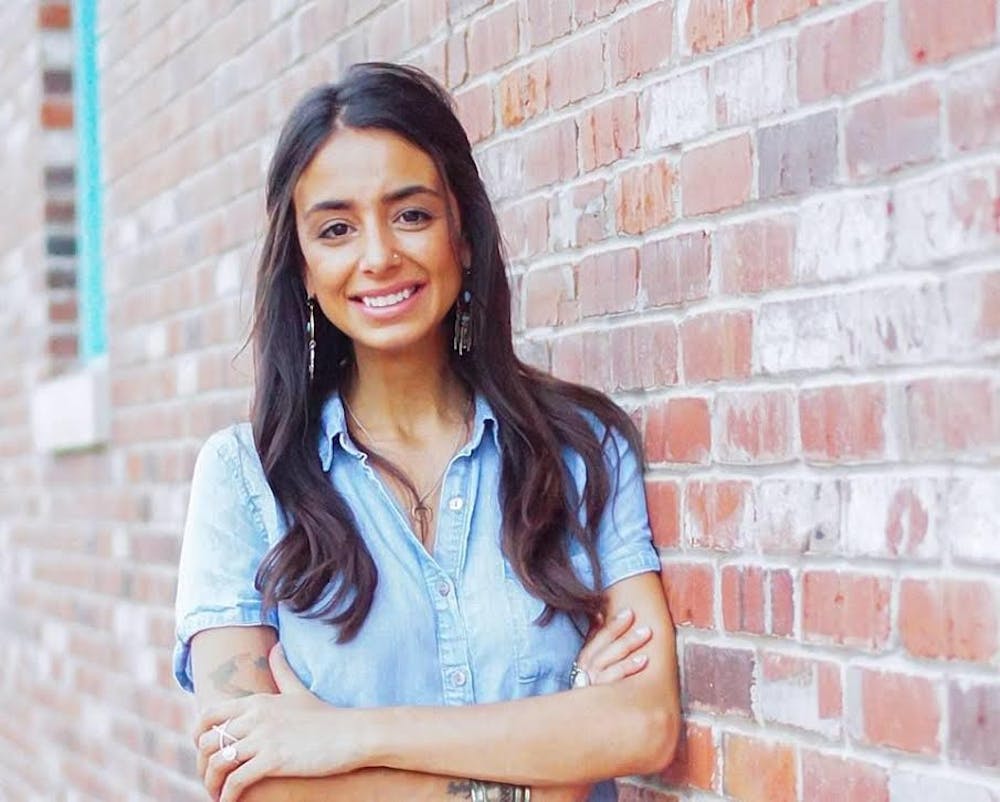In a crowd of 30 to 40, hands flew up when the question, “How many of you know someone who has been affected by sexual assault?” was asked.
Less than half of the initial hands remained in the air after the question, “How many of you know that person reported the assault?”
“Statistically, one in five girls, one in 16 boys and one in four people from the LGBT community will be sexually assaulted in college,” said Brittany Piper, a rape survivor and speaker. “But most of those cases will not be reported because these victims feel alone. It is so hard for most people to be empathetic towards sexual assault victims, which causes these people to stay quiet.”
Piper joined the Ball State community at 7 p.m. April 10 to share her story, define how narratives shape action and discuss how everyone can employ bystander intervention.
Eight years ago, Piper was abused and sexually assaulted by a man she mistook as a “good samaritan.”
The night it happened, Piper went home, got in bed and cried. If it weren’t for her roommate at the time, she said she probably never would have made it to the hospital and never would have reported the event.
“My physical appearance was terrible. I was in really bad shape,” Piper said. “So when my crying woke my roommate up and she came in to check on me, she looked at me and didn’t even ask questions. She knew something was wrong, so she picked me up out of bed, put me in her car and drove me to the hospital. She is one reason I am able to talk about it today.”
Over the next few years, Piper had trouble dealing with the pain and the shame she felt because of her assault.
One bad night, she flatlined after drinking 10 shots in 45 minutes at a party in college. At the hospital, they registered her with a blood alcohol content of .408.
After that, Piper began attending survivor groups and AA meetings where she felt she could talk openly and people understood what she was going through.
“Even though my case was clear cut, black and white, people still told me that I had it coming, that the assault was my fault because I let him into my car,” Piper said. “There was DNA evidence and surveillance cameras that proved he was guilty, and yet, somehow it was still my fault. Rape is the only type of assault where you have to prove you’re a victim.”
Because of these comments and attacks, it took three to four years for Piper to publically speak about her assault.
“My first public event was at Butler, and I was on a panel with the detective and rape victim nurse who were both on my case. They have become two great women in my support system,” Piper said. “But, I cried my whole way through the presentation, and I mostly read from a script, but it was good for me.”
Today, Piper is able to speak openly about her situation and she also plays the televised clip of her court session. She said that she has seen it more than 100 times and she knows that it is a different chapter in her life, so she does not look at it with sadness anymore.
“I think it was great to have Brittany here because I think it is important to spread awareness, especially on a college campus,” said Ashley Heilmann, a freshman environmental science major. “A lot of times, you hear stories in the news, but not from survivors, and I think those stories are what really hit close to home. It really made me want to cry when the news anchors described her as poised during her trial. It was really inspiring.”
Piper said the most important message she hopes to get across by telling her story is that narratives are what drive action. Facts and statistics may or may not stick in minds, but narratives go straight to the heart.
“When it comes to prevention, programs feel very classroomy to me. It is so easy for students to disconnect,” Piper said. “But I have seen the power that stories have. When people share their testimonies, others want to listen. They want to connect and see themself in the speaker. Stories give people a sense of, ‘I’ve come through this, so you can too.’”
There is currently a campaign called ‘It’s On Us’ on college campuses as an initiative to bring attention to bystander intervention, because anyone can be a bystander at any time.
Piper said the campaign is a great way to educate students because a rape doesn’t have to happen right in front of them in order for them to step in and help someone.
“The biggest thing I got from this event, was the idea of how consent is represented in our culture,” said Nate Lex, a sophomore telecommunications major. “You feel like there’s not a lot you can do because the event is bigger than you, but there are steps you can take to say it’s not OK.
“As a guy, I think it typically feels like I can’t do much, but the way I treat and talk about women can perpetuate a better culture and set an example for others.”
Contact Tier Morrow with comments at tkmorrow@bsu.edu or on Twitter at @tiermorrow.





